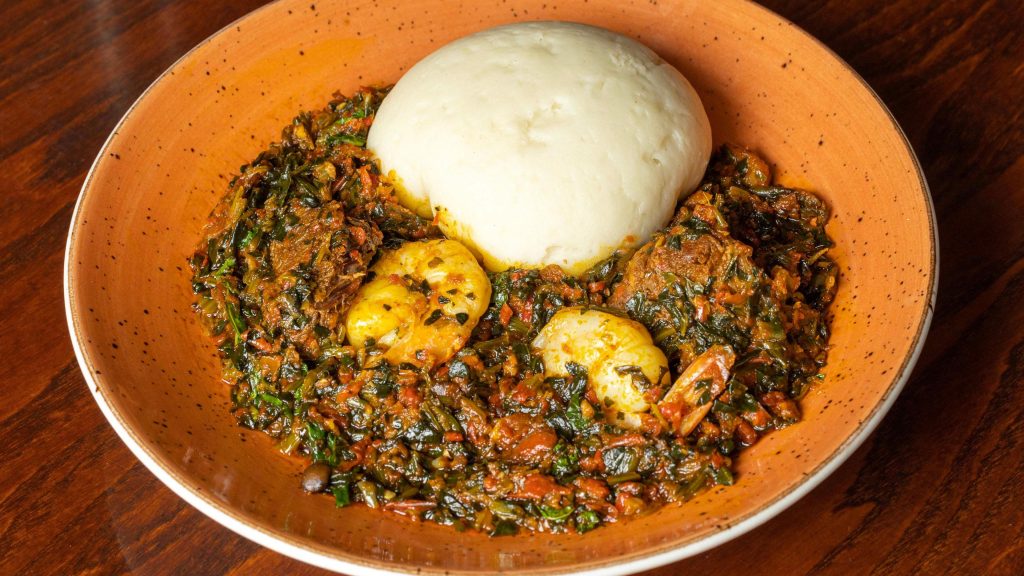The Rise of Nigerian Cuisine: A Culinary Revolution
3 min read

Have you ever tasted fufu, efo riro, or moi moi? If not, you might soon have the chance, as Nigerian dishes are increasingly becoming popular in the UK dining scene.
Nigerian restaurants are sprouting up across high streets, and West African cuisine is making its way into supermarkets. Sainsbury’s, for instance, now offers ready-made meals featuring beloved Nigerian dishes like Gizdodo, Eforiro, and Ayamase.
According to Lumina Intelligence, a market research firm specializing in the restaurant sector, “The notable trend over the past eight years has been the emergence of West African, particularly Nigerian, fine dining establishments.” The Nigerian food service market is projected to reach $10 billion in 2024 and is expected to soar to $17 billion by 2029.
In a 2018 report, the BBC suggested that West African cuisine would become “the next big food trend.” Fast forward a few years, and it appears that prediction is coming true. So, what sets Nigerian food apart?
Nigerian cuisine is characterized by its vibrant colors, bold flavors, and unique textures, often designed for sharing, making it a social experience. Typically, meals are eaten using one’s hands, enhancing the communal aspect of dining.
If you visit a Nigerian restaurant, you might be tempted to try:
The increasing popularity of Nigerian cuisine reflects the growth of the Nigerian community in the UK, aided by social media platforms like TikTok, where viral trends showcase the culinary delights of Nigeria. The interest has also been amplified by high-profile endorsements.
For instance, Australian actor Hugh Jackman was recently seen enjoying a meal at Enish, a Nigerian chain restaurant located on London’s Oxford Street, after his children recommended it. Enish has expanded globally, with locations from Dubai to Lewisham.
Similarly, Beyoncé’s Beygood Foundation donated £8,000 to help Emeka and Iffy Frederick sustain their restaurant, Chuku’s, in north London. This establishment, which claims to be the world’s first Nigerian tapas restaurant, opened just before the pandemic but managed to survive the challenges posed by lockdowns thanks to this support.
Chuku’s aims to share the richness of Nigerian culture while fostering a welcoming atmosphere for all diners.
Adding to this culinary landscape is Adejoké Bakare, the first Black female chef in the UK to earn a Michelin star and only the second globally. Bakare’s restaurant, Chishuru, debuted as a pop-up in Brixton in September 2020. Following a stellar review from food critic Jay Rayner, it transitioned into a permanent fixture in London’s West End in September 2023. She aspires for Michelin to “start looking at the continent” as recognition for the richness of African cuisine grows.
Among the new generation of Nigerian restaurants is Tasty African Food, which recently opened its 28th branch in Sittingbourne, Kent. Business development manager Simi Olaleye attributes the rising interest in Nigerian cuisine to evolving palates and a more interconnected world. “People are increasingly eager to explore African food, especially familiar flavors from our music and culture through artists like Wizkid and Burna Boy,” he explains.
As culinary enthusiasts venture into the world of Nigerian food, they discover not just new flavors but an entire culture and history that comes with every dish.
With Nigeria being Africa’s most populous nation and over 270,000 Nigerians residing in England and Wales, the question arises: Will dishes like jollof rice or efo riro become as beloved in the UK as tikka masala or chow mein? The future looks promising for Nigerian cuisine, inviting everyone to take a seat at the table.